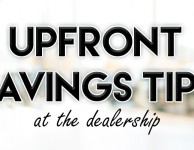Avoiding Online Car Buying Scams
It’s a fact: buyers are increasingly turning to the internet to buy their cars.
As the popularity of mobile devices spreads, car shoppers are simply not visiting the dealership as often. But this new trend of shopping for cars online has left the door wide open for a new wave of scams. In an effort to save you time, money and what might be a splitting headache, we’ll take a look at a few red flags of an online scam and the best way to avoid them.
Sounds Too Good to Be True? It Is.
With soaring competition between car dealerships, scammers have found that listing an extremely underpriced vehicle earns the attention of many online car shoppers. If you find a car online that appears to be the best deal you’ve come across yet, keep in mind it might be a scam. I’m not implying that you should automatically ignore what may just be an oversight or a generous seller, but always approach these interactions with caution. Make sure you discuss with the seller why the price is so low and always request a vehicle history report.
Poorly Written Ads
Most likely, if you’re researching a car listing from a professional seller it will be well-written, informative and contain few errors, if any. Poorly written ads that include multiple misspelled words, broken English or incomplete information are a sign that perhaps the seller is, at best, not a professional. At worst, you’re staring at another online scam. Though a scam may originate from anywhere, many companies investing time in orchestrating an online scam are located overseas.
Non-Traditional Payment Methods
Paying a private seller, or at least one you have not met in person, is always slightly riskier than working with a dealership. But when shopping for cars online, sellers asking for payment via bank-to-bank transfer, money order or wire should raise a few alarm bells. If a seller is requesting a form of payment you’re not comfortable with, always proceed with caution and protect your funds. Some experts recommend using an escrow service, however, this has not caught on by private party sellers yet.
Remote Sellers
The term “remote sellers” applies to sellers based in a location completely different from that of the listed vehicle. There are legitimate sellers that live elsewhere, but here’s the question I have: How do they know what condition the car is in? I don’t know about you, but I want a seller to actually know about a car and describe both its good and not-so-good features. Without a reputable third party that backs your purchase decision, buying a car from a remote seller certainly adds a layer of risk.
Shop Wisely
As you’re reading this, there will be more and more scams cropping up online. The best way to protect yourself is to shop wisely and always trust your gut. Does it seem weird that a seller refuses to talk to you on the phone? Are they reluctant to meet in person or involve a third party? Even if you can’t put your finger on why a seller seems “off,” it is better not to take the risk and shop elsewhere than it is to become victim of a scam.
Have you had a bad experience shopping for a car online? Let us know in the comments below.






